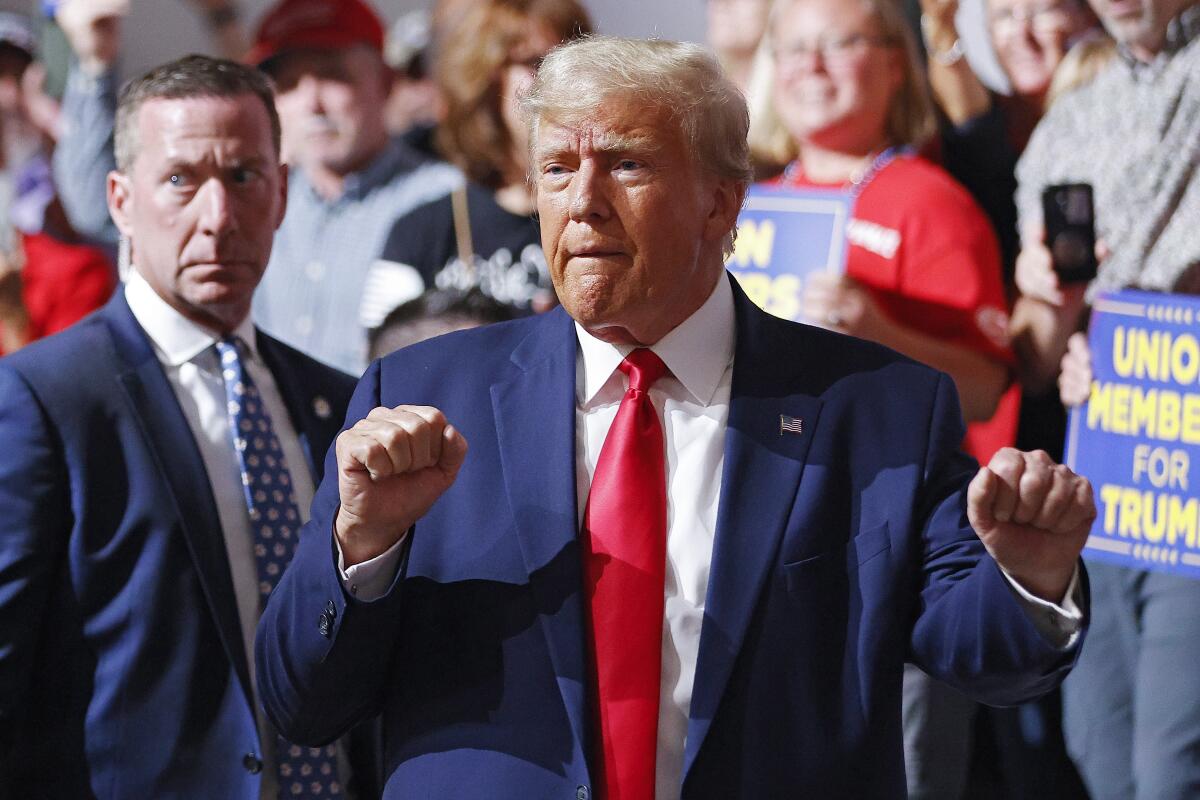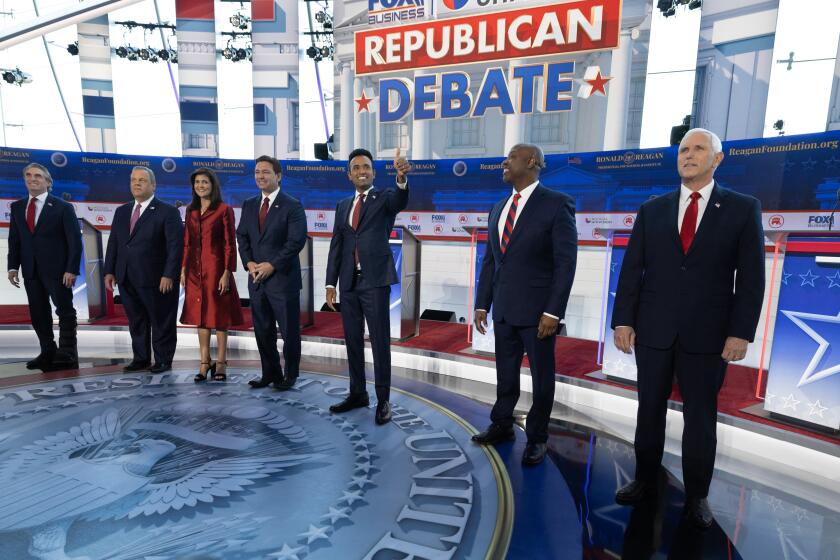Trump rails against electric cars in Michigan while his GOP challengers debate

- Share via
CLINTON TOWNSHIP, Mich. — As his Republican rivals sparred onstage in California at their second primary debate, Donald Trump was in battleground Michigan on Wednesday night working to win over blue-collar voters by lambasting President Biden and his push for electric cars in the midst of an autoworkers’ strike.
“I will not allow under any circumstances the American automobile industry to die,” Trump said at Drake Enterprises, a nonunionized auto parts supplier in Clinton Township, about half an hour outside Detroit.
As Wednesday’s GOP presidential debate at the Reagan library made clear, the Republican Party has moved a long way from Reaganism.
The Republican front-runner’s trip came a day after Biden became the first sitting U.S. president to walk a picket line as he joined United Auto Workers in Detroit. The dueling appearances had the feel of the opening salvo of the 2024 general election, which increasingly looks like a rematch between Trump and Biden, even though primary voting won’t begin until next year.
Trump’s decision to skip another debate comes as he maintains a commanding lead in the GOP primary, even as he faces four separate criminal indictments in four states.
Trump, in his speech, tried to cast Biden as hostile to the auto industry and workers, using extreme rhetoric to claim the industry was “being assassinated.” He insisted Biden’s embrace of electric vehicles — a key component of his clean-energy agenda — would ultimately lead to lost jobs, amplifying the concerns of some autoworkers who worry that electric cars require fewer people to manufacture and that there is no guarantee factories that produce them will be unionized.
“He’s selling you out to China, he’s selling you out to the environmental extremists and the radical left,” Trump told his crowd, flanked by American flags and pallets of auto parts.
He also downplayed the strike as the UAW pushes for higher wages, shorter workweeks and assurances from the country’s top automakers that new electric vehicle jobs will be unionized. Although Trump said he supported the workers and hoped they would get a good deal, he also said no deal would matter if proposed pollution limits take effect.
“You’re all on the picket lines and everything, but it doesn’t make a damn bit of difference what you get, because in two years you’re all going to be out of business,” he said.
While Trump has cast himself as pro-worker, he has clashed repeatedly with union leadership and tried to turn union members against their leaders. In a recent campaign video, he urged autoworkers to not pay union dues and claimed their leaders have “got some deals going for themselves.”
Just hours before Trump’s visit, the UAW posted a video on its Facebook page protesting factory closures by Detroit’s automakers that included 2017 footage of Trump telling a northern Ohio crowd that auto jobs would be coming back. Two years later, General Motors closed a huge assembly plant in Lordstown, Ohio, costing thousands of jobs.
Still, Trump repeatedly urged the union to endorse him, at one point directly appealing to UAW President Shawn Fain.
Although the union has withheld its support for Biden after endorsing him in 2020, Fain appeared at Biden’s side during his visit Tuesday and has repeatedly criticized Trump.
“I don’t think he cares about working-class people. I think he cares about the billionaire class, he cares about the corporate interests. I think he’s just trying to pander to people and say what they want to hear, and it’s a shame,” Fain said this week.
Biden’s reelection campaign, in a statement, called Trump’s speech “a pathetic, recycled attempt to feign support for working Americans.”
Drake Enterprises, where Trump spoke, makes automotive and heavy-duty truck components, including gear shift levers for semi-trucks, said its president, Nathan Stemple. He said a shift to electric cars would cripple his business.
Trump aides had said the audience would include several hundred current and former UAW members, as well as members of plumbers and pipefitters unions, but it also included many non-union workers who support the former president. Some said they had been invited by people who did business with Drake; others said they had simply arrived at the factory Wednesday afternoon and had been allowed to attend.
Tony Duronio, 64, a longtime Trump supporter and real estate broker who lives in Clinton Township, said he received an invitation from a group called Autoworkers for Trump. Duronio praised the economy during Trump’s time in office and echoed the former president’s criticism of electric vehicles: “Nobody wants ‘em,” he said — and applauded Trump’s decision to skip the debate.
“He’s the front-runner. He doesn’t have any competition,” he said. “Look, if it ain’t him, I may stay home ’cause the rest are no different than Biden.”
Trump briefly mentioned the debate happening 2,000 miles away at the Ronald Reagan Presidential Library, calling his GOP rivals “job candidates.”
“They’ll do anything,” he said. “Secretary of something. They even say VP, does anybody see any VP in the group? I don’t think so.”
The former president has tried to use the strike to drive a wedge between Biden and union workers, a constituency that helped pave the way for his surprise 2016 victory. Trump in that election won over voters in Democratic strongholds such as Michigan, Wisconsin and Pennsylvania, fundamentally reshaping voting alliances as he railed against global trade deals and vowed to resurrect dying manufacturing towns.
But Biden won those states back in 2020 as he emphasized his working-class roots and commitment to organized labor. He often calls himself the “most pro-union president” in U.S. history and argues the investments his administration is making in green energy and electric vehicle manufacturing will ensure the future of the industry unfolds in the U.S.
There’s disagreement in the auto industry over whether the shift to EVs will cost union jobs. Some executives say that because electric vehicles require fewer moving parts, companies will need 30% to 40% fewer workers to assemble them. But others say EVs will require comparable labor.
The Trump campaign has vigorously defended his record as pro-worker, but union leaders say his first term was far from worker-friendly — citing unfavorable rulings from the nation’s top labor board and the U.S. Supreme Court, as well as unfulfilled promises of automotive jobs and the closure of the Ohio GM plant.
Along the picket line, workers have been split. Adrian Mitchell, who works at the GM parts warehouse that Biden visited, said he believes Biden would be better for the middle class than a second Trump term. Still, Mitchell said workers are worried the transition to electric cars may cost them jobs.
It was a different scene at Trump’s event, filled with MAGA hats and pro-Trump signs.
“Let’s put it this way: There’s nothing I don’t like about Trump,” said Johnny Pentowski, who was a member of the Teamsters Union before he retired as a truck driver this year.
Pentowski, 72, who lives in Eastpointe, Mich., accused union leaders of failing to listen to their members and shared Trump’s skepticism of EVs.
“You take away fossil fuels from a country, you’re taking away its lifeblood,” he said. “Windmills and solars don’t do it.”
The UAW’s targeted strikes against the Big Three automakers — General Motors, Stellantis and Ford — began at midnight on Sept. 14 and have since expanded to 38 parts distribution centers in 20 states.
The union is asking for 36% raises in general pay over four years and has also demanded a 32-hour week with 40 hours of pay and a return of cost-of-living pay raises, among other benefits. It also wants to be allowed to represent workers at 10 electric vehicle battery factories, most of which are being built by joint ventures between automakers and South Korean battery makers.
Although Biden has not implemented an electric vehicle mandate, he has set a goal that half of all new vehicle sales be electric by 2030. His administration has also proposed stiff new automobile pollution limits that would require up to two-thirds of new vehicles sold in the U.S. to be electric by 2032, a nearly tenfold increase over current electric vehicle sales. That proposal is not final.
More to Read
Get the L.A. Times Politics newsletter
Deeply reported insights into legislation, politics and policy from Sacramento, Washington and beyond. In your inbox three times per week.
You may occasionally receive promotional content from the Los Angeles Times.











